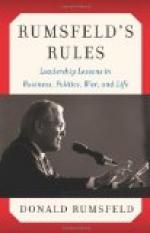But from this follows another change, equally unsuspected by the Ministry. The day that the Nation discovers, as it is now beginning to discover, that war makes its claims on every man and on every household, there will be no more toleration of the unskilled management that is inseparable from the practice of choosing a. Secretary of State for War for his ignorance of the subject. The British Nation is at length opening its eyes to the truth that war is a serious matter, and that the neglect of it in peace is costly in blood and perilous to the body politic. When its eyes are wide open it will insist on putting knowledge in power over the Army and the Navy. Thus is coming about, to the infinite benefit of the community, the overthrow of that noxious sham, the party politician.
Late in the day, when the position has become what it is, the Government has thought of the elementary principle that if you want to carry on a war you should begin by finding a commander in whom you have confidence. Accordingly at the eleventh hour Ministers have remembered that the Nation trusts Lord Roberts. This is proof positive that the Government was not in earnest before the late reverses, for had they been serious they would have appointed Lord Roberts and Lord Kitchener at the outset. The precedent is useful by what it suggests; for, if during a war you can strengthen the military direction by giving the authority to the man recognised as the most competent, you may also strengthen the political direction by a similar procedure. The Cabinet has thus, perhaps without suspicion of what it was doing, set before the Nation the true problem: “Wanted, a Ministry competent in the management of war.”
THE NATION’S BUSINESS
December 28th, 1899
War is the Nation’s business and, when it comes, the most important part of the Nation’s business. A Nation that for many years neglects this branch of its affairs is liable to suffer to any extent. The proverb, “a stitch in time saves nine,” gives a very fair idea of the proportion between the amount of effort required in a properly-prepared and well-conducted war, and the amount required when there has been previous neglect.




